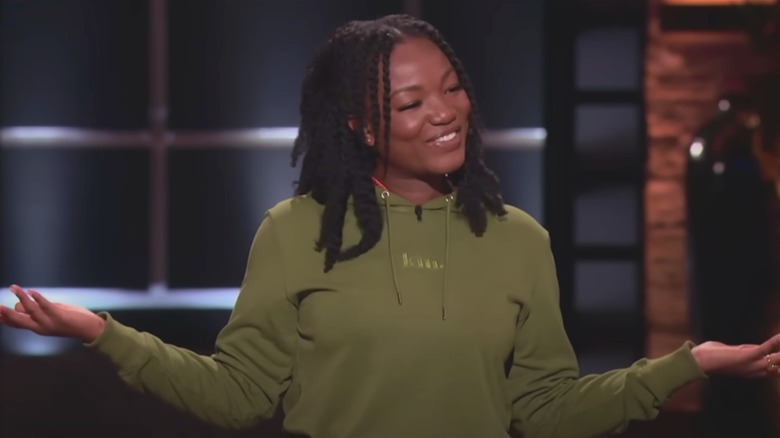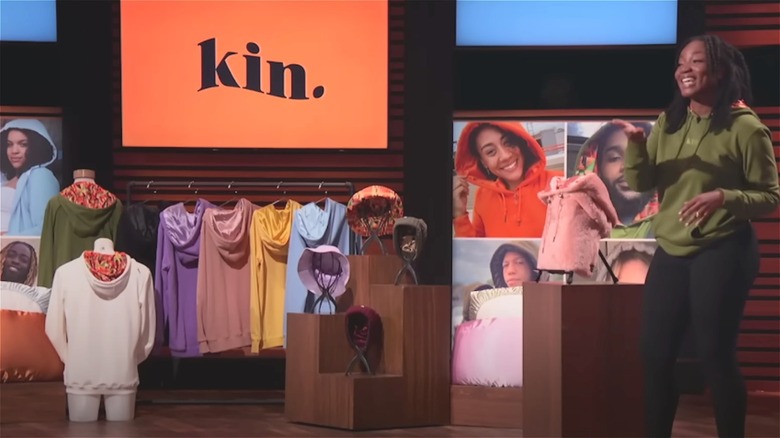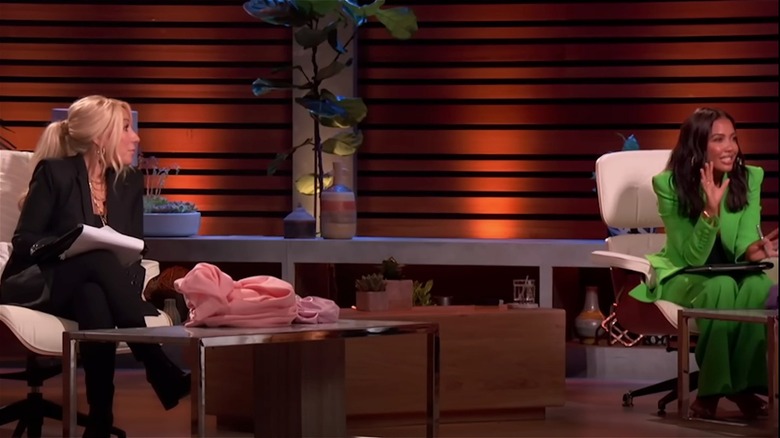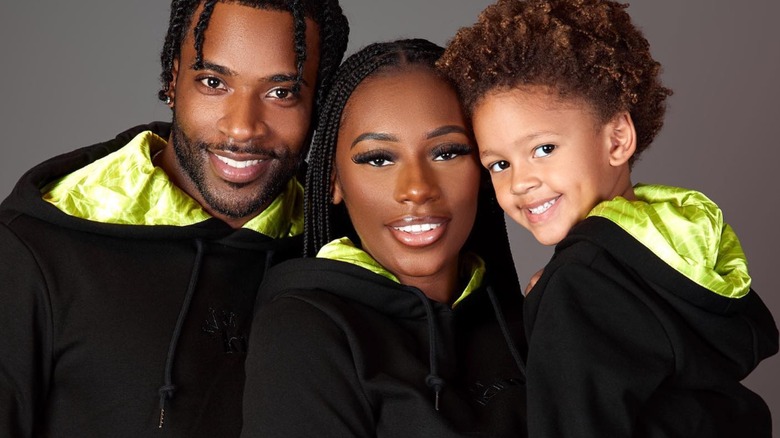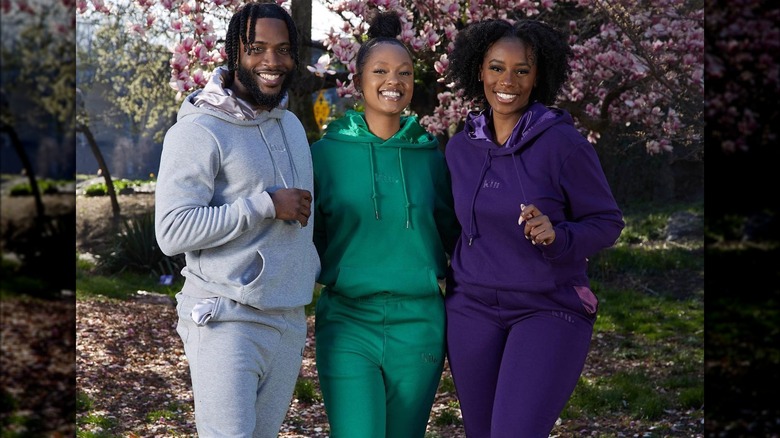What Happened To KIN Apparel After Shark Tank?
When KIN Apparel founder Philomina Kane walked into the "Shark Tank" in Season 13, she had one goal: combining functional fashion with inclusive hair care. She ended up walking out of the tank in tears, but luckily, they turned out to be tears of joy over landing a deal with two "Shark Tank" investors, Lori Greiner and Emma Grede.
Kane founded KIN Apparel after realizing that the stress of studying ecological biology at Princeton University was causing her hair to fall out. To save her hair from further damage, she started wrapping her natural hair in silk scarves before wearing cotton hoodies because of the drying, damaging nature of the hoodie's material. This inspired her to create her inclusive line of silk-lined hoodies, silk pillowcases, and more.
Kane's pitch was emotional, ranging from bubbly excitement to fighting back tears — something Barbara Corcoran described as "chaotic poetry in motion" (via YouTube). And while her pitch wasn't enough to wow Corcoran, Mark Cuban, or Kevin O'Leary, Kane was able to walk away from the tank with a huge business opportunity.
Kane impressed the sharks with her passionate entrepreneurial spirit
KIN Apparel provides silk-lined alternatives to everyday clothing and accessories that directly touch hair: hoodies, zip-up jackets, scrunchies, hats, pillowcases, car seat headrests, and more. Not only are the silk-lined items more protective of all hair types, but the KIN Apparel hoods are also oversized to accommodate larger natural hairstyles like locs and afros. Kane's passion for inclusivity, dedication to her Ghanaian culture, and familiarity with truths about natural hair that no one understands was evident throughout her pitch — but it wasn't just sentimentality that allowed KIN Apparel to be so successful.
As the sharks looked over her thick hoodies, Kane explained that she started the company with $500 and made $246,000 in the first year alone. She continued to wow the sharks with her wide profit margins, describing the shipped cost of her China-manufactured hoodies as under $17 with a listing price of $80. In addition to her astounding sales and profits, Kane had zero-cost customer acquisition, thanks to her 200k following on YouTube and KIN Apparel's ability to go viral on Instagram and TikTok.
The KIN Apparel founder asked the sharks for $200,000 in exchange for 10% equity in the company. O'Leary, Cuban, and Corcoran all passed, but praised Kane for her entrepreneurial spirit. The final two sharks, Greiner and Grede, offered Kane $200,000 for 30% equity. Although Kane tried to counter-offer with a lower equity percentage, she ultimately took their deal.
KIN's 'Shark Tank' deal changed slightly following the episode
Greiner, known as the "Queen of QVC," and Grede, Good American CEO and founding partner of SKIMS, understood the potential of KIN Apparel when they went in on a joint deal with Kane — and they were right. Over one thousand orders were placed on KIN Apparel's site immediately following the "Shark Tank" episode. A few months later, KIN's revenue doubled from what it was at the time of filming to a whopping $700,000, per the Philadelphia Business Journal.
Nine months after filming the episode, Kane decided to go with a different deal than what was captured on camera. According to CNBC, Kane closed a deal with only Grede for half of the agreed-upon investment and equity. While this meant that Kane would receive less funding for her company, she would also get to keep a larger stake in KIN Apparel, which was clearly important to her as she tried to counteroffer the sharks over their higher-than-expected equity percentage.
"After due diligence [and] so much time had passed, literally nine months, I decided to only go with Emma," Kane told CNBC. The KIN founder credited Grede for this slow and steady decision, saying that Grede encouraged her to "take your time, feel people out, and use the power of discernment before making drastic decisions in life and entrepreneurship."
Is KIN Apparel still in business?
If KIN Apparel's sales are any indication, Kane was right to listen to Grede. CNBC reported that KIN Apparel made over $4.9 million in lifetime revenue as of July 2023, due in no small part to Kane's decision to expand the KIN Apparel product line. While filming the "Shark Tank" episode, KIN offered thick hoodies, pillowcases, and hats.
The KIN Apparel line has since expanded its product line and, subsequently, its customer market to include kids' clothing, multiple hat styles, umbrellas, and other silk-lined accessories. KIN also took on philanthropic efforts by partnering with the Children's Hospital of Philadelphia, donating hoodies to children undergoing chemotherapy whose fragile hair would benefit from the gentle, silk-lined hoods KIN Apparel provides.
KIN Apparel is still in business and active on social media, with nearly 200,000 Instagram followers and over 150,000 TikTok followers. At the time of this story's publication, KIN Apparel is gearing up to add a new product to its clothing line: satin-lined raglan short sets. The apparel company offers a VIP text club to get real-time updates on when the new KIN products drop.
What's next for KIN Apparel?
The future of KIN — which stands for Keep It Natural — seems bright and limitless. Kane's YouTube channel, NaturallyPhilo, seems to have slowed down following her transition to heading KIN Apparel, with the last video being published in January 2021. However, her commitment to inclusive, nurturing, and stylish products that celebrate all body and hair types remains the same.
KIN Apparel maintains excellent customer interaction on its Instagram page, which features new posts almost daily and regularly responds to excited customers' questions about product sizing, availability, and more. Kane told CNBC that the KIN Apparel team now includes 15 members, which frees up Kane's time to focus on marketing, customer service, packaging, and other business logistics. KIN's next goal appears to be getting its products into brick-and-mortar retail stores.
The Princeton grad-turned-business owner told CNBC that "Shark Tank" was "one of the best moments of my life. But there's still so much more to happen and to do if I want to see my company [reach new heights]." While KIN products sell out quickly online, it has a wide range of available items ready for purchase today so that you can start combining the best of both the hair care and fashion worlds.
